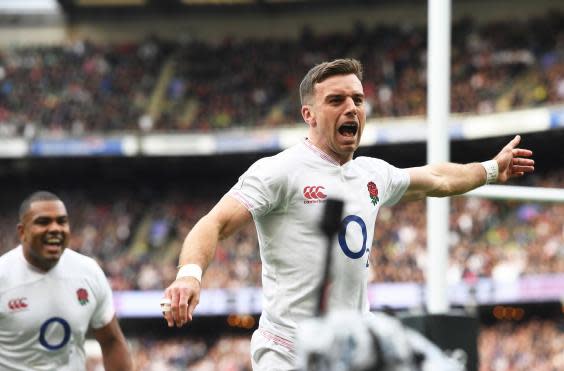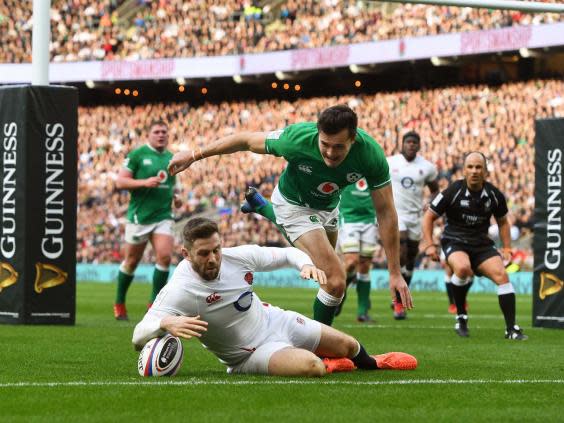England end Ireland’s Grand Slam hopes with dominant victory to maintain Six Nations title assault
England ended Ireland's Six Nations Grand Slam hopes with a dominant 24-12 victory at Twickenham, maintaining their own championship ambitions in the process, after delivering their most emphatic display of the tournament so far.
Eddie Jones heralded England’s Thursday training session as a sign that they were not only getting back to the levels they reached at the Rugby World Cup, but ready to surpass them, which raised more than a smile across the Irish Sea.
But the Australian’s words were more than vindicated by a first-half display of the highest calibre, with England romping away to a 17-0 lead from which they were able to control the round-three encounter.
First half tries from George Ford and Elliot Daly punished sloppy Irish errors and gave the hosts a comfortable half-time advantage, with Ireland delivering a dreadful opening 40-minute display that will not have impressed head coach Andy Farrell – back at the stadium where he used to grace both the pitch and coaches’ box as one of their own.
But Ireland were able to strike back with a try from centre Robbie Henshaw early in the second half, giving them the foothold that they desperately could not find in the opening stanza. Finally the contest came alive and with just 12 points between the teams, the next score would prove crucial.
It was exactly that as it sucked the wind out the sails of the Irish comeback, with replacement Luke Cowan-Dickie the benefactor of a 13-man driving maul midway through the half to all but guarantee a home victory, and the remaining 18 minutes would essentially decide by how many.
"We played with a lot of control, read the conditions well, read the referee well and at half-time if it was a cricket game we could have declared"," claimed an emboldened Jones at full-time, knowing that their dominance went a lot further than the 17 points they scored.
In the end the margin proved to be by 12 points as replacement tighthead prop Andrew Porter grabbed a deserved consolation from close range in the final minute, with the visitors refusing to give in even though the chance of a losing bonus point had long evaporated. And while the victory cemented England’s second consecutive win to keep their Six Nations championship hopes alive, perhaps the biggest telling point was that a third consecutive win over the Irish suggests they may just have their number in this rivalry.
England have waited a long six months to get back to the home comforts of Twickenham, having travelled from Newcastle to Miyazaki, Yokohama to Murrayfield in the time since they last graced south-west London. Of course, that was against the same opposition when they ran a record 57 points past Ireland in a World Cup warm-up clash, and at one stage it appeared a carbon copy was on the cards this time around.
That second-half display half-a-year ago was arguably the worst 40-minute display of the Joe Schmidt era, and when Andy Farrell eventually leaves this set-up, this first-half display could easily stand as his nightmare moment.
The most painful part of it all was that for England’s dominance, Ireland gifted both first-half tries to the hosts, and the half-time advantage could conceivably have been just nine points had Ireland learned from the error of their ways in the past.
England’s flying start was dished up to them on a plate by Johnny Sexton, but the telling signs of which way the contest would fall were visible early on. Both Jonny May and Daly beat their opposite man in the air competing for the ball, and that gave the platform for England to set up camp in the Irish half.
With seven minutes gone, recalled scrum-half Ben Youngs put a delightful chip behind the defence that sat up right on the try line, and as Sexton attempted to take the ball off the nose of half-back partner Conor Murray, he fumbled it right into the path of Ford to touch down. The fly-half momentarily lost himself in the joy of the moment, shanking the ball into the crowd and straight into the chest of one celebrating Englishman in row one, but the supporters’ thumbs up only echoed the jubilation on Ford’s face as he punched the air.
England tend to make the most of their fast starts if the last two years are anything to go by, and with Jones’s side running red hot, the lead was doubled in ridiculously similar circumstances. Once more the ball as put in behind the Irish line, this time from try-scorer Ford, and as Jacob Stockdale dallied in the hope that it would clear the dead-ball line without him requiring to field it, Daly dashed in to slap the ball down for the score.

Stockdale’s mistake was made all the more unforgivable given it was his failure to take possession in his own try area 12 months ago that handed England the advantage in Dublin, and he will wince when watching it back in the days to come.
For their dominance, England did not take the lead they probably deserved into the break, with a lone Owen Farrell penalty to show for a sustained period of pressure, while Ireland’s misery was compounded by the loss of Cian Healy to a painful-looking injury.
For this first time in his tenure as head coach, Andy Farrell needed to turn Ireland around, and whatever the message was at the break appeared to have an impact with the restart dropped by Tom Curry and Joe Marler quickly penalised for not driving straight in the scrum. With a platform to build off, Ireland finally got on the board following sustained pressure on the England line that draw three consecutive penalties, and resulted in Sexton calling for a scrum in front of the posts after Kyle Sinckler high tackled Dave Kilcoyne. Murray, CJ Stander and Josh van der Flier all had attempts to run it right, before Murray fed Henshaw to power through poor tackles from Farrell and Curry to score.

With 30 minutes remaining and the lead cut to 19 after Sexton missed the penalty, the contest finally came to life. England though they had their third when May palmed a high cross-field kick into the arms of Manu Tuilagi, but while the centre just made it to the line, referee Jaco Peyper brought play back for a knock-on off the England wing.
But in the 62nd minute the decisive blow came. Jones introduced Ellis Genge, Charlie Ewels and Willi Heinz together and the impact was an immediate scrum penalty that Farrell sent to the corner. With the driving maul set-up and Farrell, Tuilagi and May joining the pack for added gusto, replacement Cowan-Dickie managed to bundle his way over to kill off the contest.
With the clock ticking down England were content to punt the ball long and give Ireland the onus to run it back if they wanted anything more for their efforts, which to their credit they did to force one final hurrah through Porter’s try from close range.
But Jones’s words rang true at full-time, and even though the scoreboard did not reflect their complete dominance, mentally the game was won before it really got going.
Teams
England: Elliot Daly; Jonny May, Manu Tuilagi (Henry Slade, 74), Owen Farrell, Jonathan Joseph; George Ford, Ben Youngs (Willi Heinz, 58); Joe Marler (Ellis Genge, 58), Jamie George (Luke Cowan-Dickie, 52), Kyle Sinckler (Will Stuart, 69); Maro Itoje, George Kruis (Joe Launchbury, 61); Courtney Lawes (Charlie Ewels, 58), Sam Underhill, Tom Curry (Ben Earl, 66).
Ireland: Jordan Larmour (Keith Earls, 64); Andrew Conway (Ross Byrne, 66), Robbie Henshaw, Bundee Aki, Jacob Stockdale; Johnny Sexton, Conor Murray (John Cooney, 55); Cian Healy (Dave Kilcoyne, 26), Rob Herring (Ronan Kelleher, 61), Tadhg Furlong (Andrew Porter, 58); Devin Toner (Ultan Dillane, 61), James Ryan; Peter O’Mahony, Josh van der Flier (Caelan Doris, 61), CJ Stander.

